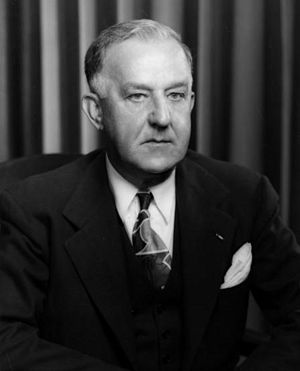Stephen Early facts for kids
Quick facts for kids
Steve Early
|
|
|---|---|
 |
|
| 3rd White House Press Secretary | |
| In office Acting: December 5, 1950 – December 18, 1950 |
|
| President | Harry S. Truman |
| Preceded by | Charlie Ross |
| Succeeded by | Joseph Short |
| In office March 4, 1933 – March 29, 1945 |
|
| President | Franklin D. Roosevelt |
| Preceded by | Theodore Joslin |
| Succeeded by | Jonathan W. Daniels |
| 1st United States Deputy Secretary of Defense | |
| In office May 2, 1949 – September 30, 1950 |
|
| President | Harry S. Truman |
| Preceded by | Position established |
| Succeeded by | Robert A. Lovett |
| Personal details | |
| Born |
Stephen Tyree Early
August 27, 1889 Crozet, Virginia, U.S. |
| Died | August 11, 1951 (aged 61) Washington, D.C., U.S. |
| Political party | Democratic |
Stephen Tyree Early (born August 27, 1889 – died August 11, 1951) was an American journalist and government official. He worked as the third White House press secretary for President Franklin D. Roosevelt from 1933 to 1945. He also served as the acting press secretary for President Harry S. Truman in 1950. Stephen Early held the role of press secretary longer than anyone else.
Contents
Stephen Early's Early Career
Stephen Early started his career as a journalist. He met Franklin D. Roosevelt in 1912. At that time, Early was a reporter covering the 1912 Democratic National Convention. From 1913 to 1917, Early worked for the Associated Press. He reported on the Navy Department, where he became good friends with Roosevelt.
Serving in World War I
During World War I, Early served in the military. He was part of an infantry regiment. He also worked for the Stars and Stripes newspaper. After the war, he returned to the United States. Roosevelt asked him to help with his 1920 Vice Presidential campaign.
Reporting on Presidents
After the election, Early went back to the Associated Press. In 1923, he reported on President Warren G. Harding's trip. He was the first reporter to announce that President Harding had died suddenly. Later, in 1927, Early became a representative for Paramount News. This company made newsreels, which were short films shown in movie theaters.
Working for President Roosevelt
After the 1932 United States presidential election, Franklin Roosevelt became president. He asked Stephen Early to join his team at the White House. Early became one of three White House Secretaries. His main job was to handle relations with the press.
Role as Press Secretary
Stephen Early served as press secretary for all of Roosevelt's time in office. He was the president's main spokesperson. He also helped solve problems for the president. Early was known for having an "open-door policy." This meant reporters could easily talk to him.
Helping Reporters Get News
Because Early used to be a reporter, he understood the news business. He tried his best to help reporters get the information they needed. Early also helped the White House Correspondents' Association make an important change. He helped them give press credentials to Harry McAlpin. McAlpin worked for the National Negro Publishers Association. In 1944, McAlpin became the first African American reporter to attend presidential press conferences.
Later Government Roles
In 1945, Stephen Early left the government for a short time. He became a vice president at the Pullman Company. This company was famous for making railway cars.
Deputy Secretary of Defense
Early returned to government work in 1949. He became the United States Deputy Secretary of Defense. He held this important position from April 1949 to June 1950. In this role, he helped manage the country's defense.
Serving President Truman
In December 1950, Early briefly returned to the White House. He served as the acting White House Press Secretary for President Harry S. Truman. He filled in after the sudden death of Charles G. Ross.
Stephen Early's Personal Life
Stephen Early passed away on August 11, 1951. He died at George Washington University Hospital. He had suffered a heart attack a week before. President Harry Truman released a statement. He called Early "an outstanding newspaper man." Truman also said Early was "always on the side of President Roosevelt."
Remembering His Legacy
In 1969, Stephen Early's wife, Helen Wrenn Early, made a special donation. She gave his important papers to the Franklin D. Roosevelt Presidential Library and Museum. These papers are now available for the public to learn from.
 | Isaac Myers |
 | D. Hamilton Jackson |
 | A. Philip Randolph |

